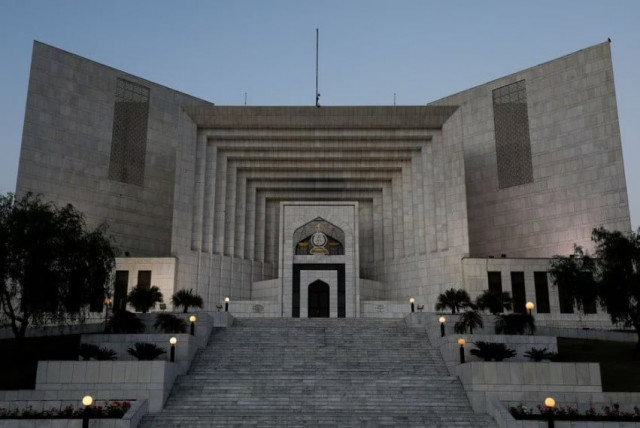Intra-court appeals under SCPPA a boon
They reflect miscarriage of justice in cases decided under Article 184(3)

The first hearing of the five-judge larger bench of the Supreme Court on the intra-court appeals against its earlier judgment that overturned the accountability law amendments is reflective of the miscarriage of justice in cases decided under Article 184(3) in the absence of the SC (Practice and Procedure) Act, 2023 (SCPPA).
If the intra-court appeal provided under the SCPPA was not available, the other option was a review, which had a very limited scope and the same judges heard the matter, while their judgments became final.
However, the larger bench led by Chief Justice of Pakistan Qazi Faez Isa on Tuesday raised certain questions of law.
The majority judgement in NAB law case could have been declared as coram non judice in view of the awaited detailed judgement in the Supreme Court Practice and Procedure Act 2023.
During the hearing, the federal government's lawyer, Saad Hashmi, referred to the intra-court appeal wherein it was contended that the petition in the earlier verdict was filed by deposed premier and PTI Chairman Imran Khan under Article 184(3).
"Through the petition, he (Imran) sought to challenge the amendments made in NAO, 1999. He alleged, albeit vaguely, that the amending provisions were violative of fundamental rights and other constitutional provisions,” the government’s intra-court appeal read.
Read Justice Mansoor wants NAB law applicable on judges, generals
"As per Section 4 of the SCPPA, 2023 any matter involving [the] interpretation of constitutional provisions had to be heard by a bench comprising not less than five judges. Under Section 3 of the SCPPA, 2023, the matter: (i) had to be placed before the committee for examination, and (ii) was to be heard by a bench comprising not less than five judges of [the Supreme Court], to be constituted by the committee,” it continued.
“The SCPPA, 2023 applied to pending matters, including the petition. In any event, the bench hearing the petition had to be re-constituted by the committee under Section 2 of the SCPPA, 2023. It is most respectfully submitted that in view of Sections 2, 3 and 4 of the SCPPA, 2023, the majority judgment is coram non judice and a nullity,” it added.
After the enactment of the SCPPA, former CJP Umar Ata Bandial did not form five-judge benches to hear the cases wherein the interpretation of the Constitution was required.
Senior lawyers, who witnessed the hearing, said there were chances that all judgments could be declared void ab initio in the detailed verdict on account of not adhering to the Section 4 of the SCPPA.
Interestingly, a three-judge bench led by former CJP Bandial had declared the Supreme Court (Review of Judgments and Orders) Act, 2023 as unconstitutional. This judgment can also be overturned.
However, a lawyer said the effects of sections 3 and 4 could not be different. It will be interesting to see how the majority judges will deal with this matter in the detailed judgment.
The larger bench on Tuesday expressed wonder as to how the majority judges struck down the first and second amendments in the National Accountability Bureau (NAB) law without examining the third one introduced in the legislation.
PPP leader and senior lawyer Farooq H Naek contended that the majority judgment in the NAB law case had made the third amendment redundant.
CJP Isa remarked that parliament had just changed the forums through amendments to the NAB law. Justice Athar Minallah noted that the law was always enforced as it could not be suspended.
There is a visible change in the approach of the judges in courtroom No 1 during CJP Isa’s tenure.
Read more SJC issues show-cause notice to Justice Naqvi
Since March 2009, judges were often giving remarks against political leaders, maladministration, corruption, etc. However, this approach has changed now as the bench led by CJP Isa is respectful towards parliament, lawmakers, and their legislation.
Unlike the past, they are not suspicious towards the actions of the lawmakers – apparently a good omen for democracy.
In the meanwhile, the Independent Group, also known as the Asma Jahangir Group, won the annual elections of the Supreme Court Bar Association (SCBA).
This group of lawyers is a strong supporter of CJP Isa’s views since May 2019.
Legal experts believe that CJP Isa will receive massive support from this group if he makes difficult decisions about self-accountability, judicial reforms, political justice and matters related to civil liberties.
Although the PML-N backed candidates won the SCBA elections, the ‘powerful circles’ also backed the Independent Group in the polls.
However, when there will be any conflict among the stakeholders, the group will stand by CJP Isa. There are even less chances now that Imran will receive any major support from the superior bars.
The Professional Group, which bagged three seats in the SCBA elections, is close to the PTI. However, the Independent Group won 14 seats.
Renowned lawyer Saiful Malook credited PML-N leader and former federal law minister Azam Nazeer Tarar's efforts for the Independent Group’s victory. Interestingly, the same section of lawyers is the complainant against SC’s Justice Syed Mazahar Ali Akbar Naqvi in the Supreme Judicial Council (SJC).



















COMMENTS
Comments are moderated and generally will be posted if they are on-topic and not abusive.
For more information, please see our Comments FAQ